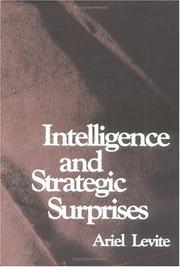| Listing 1 - 10 of 16 | << page >> |
Sort by
|
Book
ISBN: 1612342116 Year: 2002 Publisher: Washington, D.C. : Potomac Books Inc.,
Abstract | Keywords | Export | Availability | Bookmark
 Loading...
Loading...Choose an application
- Reference Manager
- EndNote
- RefWorks (Direct export to RefWorks)
Technological failure results when one side in a conflict does not fully grasp the potential impact of known, or even familiar, weapons in the enemyÆs hands. In most cases, such failure resulted from higher officialsÆ ignorance or their total misunderstanding of the importance and relevance of such technology and science as well as of their application to warfare. Technological failure is also the root cause of technological surprise. While operational surprise on the battlefield poses grave problems, technological surprise is far more serious, because, as Azriel Lorber explains, it often lead
Military weapons. --- Surprise (Military science) --- Military art and science --- History.
Book
ISBN: 0674263669 Year: 2004 Publisher: Cambridge, Massachusetts ; London, England : Harvard University Press,
Abstract | Keywords | Export | Availability | Bookmark
 Loading...
Loading...Choose an application
- Reference Manager
- EndNote
- RefWorks (Direct export to RefWorks)
September 11, 2001, distinguished Cold War historian John Lewis Gaddis argues, was not the first time a surprise attack shattered American assumptions about national security and reshaped American grand strategy. We've been there before, and have responded each time by dramatically expanding our security responsibilities. The pattern began in 1814, when the British attacked Washington, burning the White House and the Capitol. This early violation of homeland security gave rise to a strategy of unilateralism and preemption, best articulated by John Quincy Adams, aimed at maintaining strength beyond challenge throughout the North American continent. It remained in place for over a century. Only when the Japanese attacked Pearl Harbor in 1941 did the inadequacies of this strategy become evident: as a consequence, the administration of Franklin D. Roosevelt devised a new grand strategy of cooperation with allies on an intercontinental scale to defeat authoritarianism. That strategy defined the American approach throughout World War II and the Cold War. The terrorist attacks of 9/11, Gaddis writes, made it clear that this strategy was now insufficient to ensure American security. The Bush administration has, therefore, devised a new grand strategy whose foundations lie in the nineteenth-century tradition of unilateralism, preemption, and hegemony, projected this time on a global scale. How successful it will be in the face of twenty-first-century challenges is the question that confronts us. This provocative book, informed by the experiences of the past but focused on the present and the future, is one of the first attempts by a major scholar of grand strategy and international relations to provide an answer.
Surprise (Military science) --- National security --- History. --- United States --- Foreign relations.
Book
Year: 2005 Publisher: Carlisle, PA : Strategic Studies Institute, U.S. Army War College,
Abstract | Keywords | Export | Availability | Bookmark
 Loading...
Loading...Choose an application
- Reference Manager
- EndNote
- RefWorks (Direct export to RefWorks)
Surprise (Military science) --- United States --- Armed Forces --- Reorganization.

ISBN: 0674857453 Year: 1988 Publisher: Cambridge (Mass.): Harvard university press
Abstract | Keywords | Export | Availability | Bookmark
 Loading...
Loading...Choose an application
- Reference Manager
- EndNote
- RefWorks (Direct export to RefWorks)
Book
ISBN: 0813179955 0813179963 9780813178844 0813178843 9780813179964 Year: 2020 Publisher: Lexington, Kentucky
Abstract | Keywords | Export | Availability | Bookmark
 Loading...
Loading...Choose an application
- Reference Manager
- EndNote
- RefWorks (Direct export to RefWorks)
The ability to change swiftly from peace, or prolonged low intensity conflict, to the high intensity of war and succeed in the initial engagements is usually discussed in terms of readiness, capabilities, and capacity, and their related material, personnel, doctrine, and training. Every security establishment - whether state or non-state - is familiar with these aspects. This text deals with important, complementary, but generally neglected 'soft' aspects of moving from peace to war, such as the mental ability to shift from one reality to another; consolidating a coherent doctrine when war erupts in the course of an ongoing peacetime conceptual-doctrinal debate; gaining proficiency on short notice when new weapon systems become available only at the last minute (or even after units have deployed) and so forth.
Military readiness. --- Military doctrine. --- Surprise (Military science) --- Military history, Modern --- Uncertainty --- Research. --- Israel.
Book
Year: 2002 Publisher: [Washington, D.C.] : Center for Strategic Intelligence Research, Joint Military Intelligence College,
Abstract | Keywords | Export | Availability | Bookmark
 Loading...
Loading...Choose an application
- Reference Manager
- EndNote
- RefWorks (Direct export to RefWorks)
Intelligence service --- Military intelligence --- Surprise (Military science) --- National security --- Deception --- United States.
Book
Year: 2008 Publisher: Carlisle, Pa. : Peacekeeping and Stability Operations Institute and Strategic Studies Institute, U.S. Army War College,
Abstract | Keywords | Export | Availability | Bookmark
 Loading...
Loading...Choose an application
- Reference Manager
- EndNote
- RefWorks (Direct export to RefWorks)
Surprise (Military science) --- Military art and science. --- Strategy. --- United States. --- Rules and practice.

ISBN: 0231063741 Year: 1987 Publisher: New York (N.Y.) : Columbia university press,
Abstract | Keywords | Export | Availability | Bookmark
 Loading...
Loading...Choose an application
- Reference Manager
- EndNote
- RefWorks (Direct export to RefWorks)
Book
ISBN: 0804777152 9780804777155 9780804774888 0804774889 9780804774895 0804774897 Year: 2011 Publisher: Stanford, Calif. Stanford Security Studies
Abstract | Keywords | Export | Availability | Bookmark
 Loading...
Loading...Choose an application
- Reference Manager
- EndNote
- RefWorks (Direct export to RefWorks)
This book addresses one of the basic questions in military studies: How can armies cope effectively with technological and doctrinal surprises-ones that leave them vulnerable to new weapons systems and/or combat doctrines? Author Meir Finkel contends that the current paradigm-with its over-dependence on intelligence and an all-out effort to predict the nature of the future battlefield and the enemy's capabilities-generally doesn't work.
Military readiness. --- Military doctrine. --- Military art and science. --- Surprise (Military science) --- Military history, Modern --- Technology --- Military aspects.
Book
Year: 2009 Publisher: Washington, D.C. : Office of the Under Secretary of Defense for Acquisition, Technology, and Logistics,
Abstract | Keywords | Export | Availability | Bookmark
 Loading...
Loading...Choose an application
- Reference Manager
- EndNote
- RefWorks (Direct export to RefWorks)
Surprise (Military science) --- Military planning --- Military readiness. --- National security --- Terrorism --- Weapons of mass destruction --- Prevention --- Government policy --- United States --- Armed Forces --- Operational readiness. --- Military policy.
| Listing 1 - 10 of 16 | << page >> |
Sort by
|

 Search
Search Feedback
Feedback About UniCat
About UniCat  Help
Help News
News